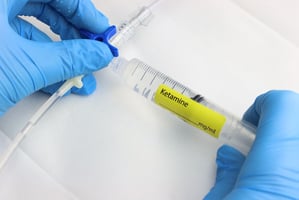Patients presenting to an emergency room with complaints of suicidal thoughts may experience relief...
Intravenous Ketamine May Be Effective in Treating Chronic PTSD, Preliminary Study Suggests
 |
Researchers at the Icahn School of Medicine at Mount Sinai conducted a proof-of-concept randomized, double-blind, crossover trial comparing ketamine with an active placebo control, midazolam. Subjects received intravenous infusion of ketamine or midazolam. The primary outcome measure was change in PTSD symptom severity, measured with the Impact of Event Scale–Revised. Secondary outcome measures included the Montgomery-Asberg Depression Rating Scale, the Clinical Global Impression-Severity and Clinical Global Impression–Improvement scales, and adverse-effect measures.
Ketamine infusion was associated with significant and rapid reduction in PTSD symptom severity, compared with midazolam, when assessed 24 hours after infusion. It was also associated with reduction in comorbid depressive symptoms and improvement in overall clinical presentation. Ketamine was generally well tolerated.
Lead author Adriana Feder, M.D., told Psychiatric News that the study is the first proof-of-concept, randomized clinical trial of a single intravenous dose of ketamine for patients with chronic PTSD, compared to a single intravenous dose of midazolam. Since it is a proof-of-concept study, however, she said that "longer-term clinical trials will be necessary to determine whether ketamine will be a useful treatment for PTSD in clinical practice. To date, few pharmacotherapies have been shown to be sufficiently effective in the treatment of PTSD. These findings may lead to novel approaches in the treatment of this condition.” Feder noted that she and the study's principal investigator, Dennis Charney, M.D., have been named as inventors on a patent application covering use of ketamine for PTSD treatment. The study was funded by a grant from the Department of the Army-U.S. Navy Medical Researcher Acquisition Activity.
To read about research on other possible uses of ketamine in treating mental illness, see the Psychiatric News article, "Ketamine Outperforms ECT in Depression Study."
(Image: Andrii Kondiuk/shutterstock.com)





